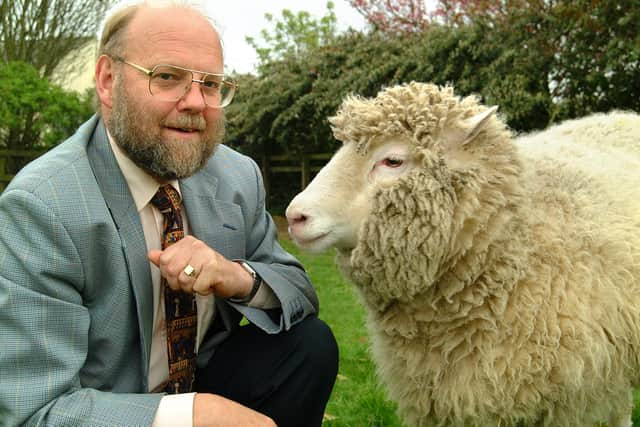Sir Ian Wilmut: Scientist who helped clone Dolly the Sheep dies aged 79
and live on Freeview channel 276
One of the creators of the first cloned animal, Dolly the Sheep, has died at the age of 79 from complications of Parkinson's disease on 10 September 2023.
Professor Sir Ian Wilmut was among the leaders of a team at The Roslin Institute at the University of Edinburgh that used a cell from the mammary gland of a dead adult sheep to create a living animal that was genetically identical to the donor.
Advertisement
Hide AdAdvertisement
Hide AdThis work laid the foundations for stem cell research, with the aim to cure many diseases caused by ageing by enabling the body to regenerate damaged tissue.


Announcing Sir Ian's death, Professor Sir Peter Mathieson, the vice chancellor of the University of Edinburgh, said: "We are deeply saddened to hear of the passing of Professor Sir Ian Wilmut.
"He was a titan of the scientific world, leading the Roslin Institute team who cloned Dolly the sheep - the first mammal to be cloned from an adult cell - which transformed scientific thinking at the time.
"This breakthrough continues to fuel many of the advances that have been made in the field of regenerative medicine that we see today.
"Our thoughts are with Ian's family at this time."
Advertisement
Hide AdAdvertisement
Hide AdIn 1996, Sir Wilmut and his team successfully cloned Dolly the sheep using a cell taken from the mammary gland of a six-year-old Finn Dorset sheep and an egg cell taken from a Scottish Blackface sheep.
She was announced to the world in February 1997, and was part of a series of experiments at The Roslin Institute looking to develop a better method for producing genetically modified livestock.
Dolly's DNA came from a mammary gland cell, so she was named after the country singer Dolly Parton. She lived a normal life at the institute before her death in 2003 at the age of six.
Sir Wilmut retired from the University of Edinburgh in 2012 and revealed a diagnosis of Parkinson's disease six years later.
Advertisement
Hide AdAdvertisement
Hide AdIn a 2018 interview with the BBC, Sir Ian said: "There was a sense of clarity, well at least now we know and we can start doing things about it.
"As well as obviously the disappointment that it will possibly shorten my life slightly, and more particularly it will alter the quality of life."
Prof Bruce Whitelaw FRSB, director of The Roslin Institute which oversaw the breakthrough, said "science has lost a household name".
"Ian led the research team that produced the first cloned mammal in Dolly," he said.
Advertisement
Hide AdAdvertisement
Hide Ad"This animal has had such a positive impact on how society engages with science, and how scientists engage with society. His legacy drives so many exciting applications emerging from animal and human biology research."
Comment Guidelines
National World encourages reader discussion on our stories. User feedback, insights and back-and-forth exchanges add a rich layer of context to reporting. Please review our Community Guidelines before commenting.
